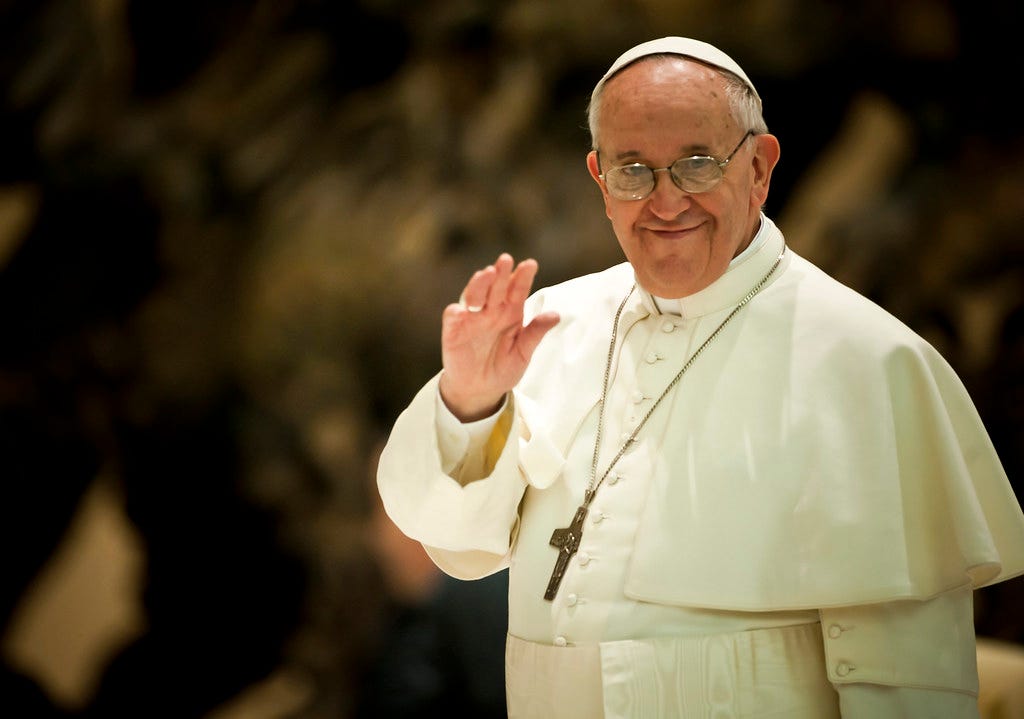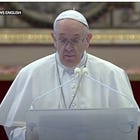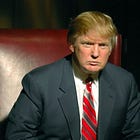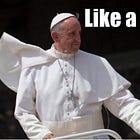Best Pope Ever Has Final Moments Wasted By JD Vance
We're not saying he killed him, but ...
Pope Francis has died at the age of 88, following several months of ill health and a meeting with JD Vance, during which he likely exhausted himself trying to convince the Roman Catholic convert that compassion is good and sending people to torture prisons is bad. He had first snubbed a meeting with Vance, sending a cardinal to lecture him on compassion instead. There are certainly Wonkette staffers who are angry — make that incandescent with rage — that Vance got to waste any of Francis’s final minutes, whether he actually killed him or not.
We’re not lining up to shake Vance’s cursed hand, that is for sure.
“How much contempt is stirred up at times towards the vulnerable, the marginalized and migrants,” he said in his Easter address, right after meeting with Vance. Francis, the son of an immigrant who fled fascist Italy, has long criticized the Trump administration’s attitudes and policies on immigrants (and pretty much everything else), just recently calling them a “disgrace” on Italian television. (He also criticized the Obama administration on the same topic.)
Pope Francis was, without question, the best pope ever — and while, yes, we are talking about a group of people that includes Ratzinger and Pope Stephen VI, who had the corpse of his predecessor dug up and put on trial to “prove” he was never legally the pope to begin with, he still stands out as an extraordinarily kind and decent person who cared about poor people, social justice, and the planet.
Born Jorge Mario Bergoglio in 1936, Pope Francis was the first Jesuit pope (which you should know is a very big deal), the first Latin American pope, as well as the first pope to have ever worked as a bouncer at a nightclub. Perhaps most importantly, he was the first pope to address the problem of child sexual abuse in the Church, whereas both John Paul II and Benedict XVI not only actively ignored sexual abuse in the church in general, but allegedly, as archbishops, also ignored sexual abuse they personally knew was going on.
Francis also changed the Roman Catholic Church’s Code of Canon Law to explicitly make “sexual abuse, grooming minors for sex, possessing child pornography and covering up abuse” criminal offenses for clerics. Granted, the law considers them offenses against the sixth commandment, “Thou shalt not commit adultery,” but it was something.
Though he was not always perfect on the issue, the more he listened to survivors, the better he became at addressing their concerns. In September of last year, he met with 17 Belgian survivors of clerical abuse and promised to help them.
Granted, as a Catholic, Pope Francis did not so much share our views on certain things, but he spent far less time railing about cultural issues and more on helping the poor, on social and economic justice, helping immigrants and refugees, taking care of the planet, etc. etc. He encouraged the Catholic Church and its members to do so as well, often incurring the wrath of conservative Catholics who were really only there to hate abortion and LGBTQ+ people.
While he didn’t go so far as endorsing same-sex marriage in the Church, he did say he was fine with non-liturgical blessings and opposed the criminalization of homosexuality. In 2013, he famously said in a press conference, “We shouldn’t marginalize people for this. They must be integrated into society … If someone is gay and he searches for the Lord and has good will, who am I to judge?” In 2023, he said that laws criminalizing homosexuality were a sin, “Condemning a person like this is a sin. Criminalising people with homosexual tendencies is an injustice.”
In 2013, he famously stated that even atheists could go to heaven, “The Lord has redeemed all of us, all of us, with the Blood of Christ, all of us, not just Catholics. Everyone! ‘Father, the atheists?’ Even the atheists. Everyone!” which was nice of him. It’s certainly better than gleefully wishing anyone burn in fire for all eternity.
As a Jesuit, Francis tended more towards the social justice Catholic side of things, and had a far more balanced take on liberation theology than his predecessors. In 2013, he dropped his apostolic exhortation, Evangelii Gaudium (The Joy of Gospel), demanding that the Church take poverty as seriously as anything else considered a sin.
“Just as the commandment ‘Thou shalt not kill’ sets a clear limit in order to safeguard the value of human life, today we also have to say ‘thou shalt not’ to an economy of exclusion and inequality. Such an economy kills,” he wrote. “How can it be that it is not a news item when an elderly homeless person dies of exposure, but it is news when the stock market loses two points? This is a case of exclusion. Can we continue to stand by when food is thrown away while people are starving? This is a case of inequality.”
“I encourage financial experts and political leaders to ponder the words of [Saint John Chrysostom], one of the sages of antiquity: ‘Not to share one's wealth with the poor is to steal from them and to take away their livelihood. It is not our own goods which we hold, but theirs,’” he continued, sounding suspiciously like me in college (and also now).
On Easter five years ago, he even called for a universal basic income.
Many of you live from day to day, without any type of legal guarantee to protect you. Street vendors, recyclers, carnies, small farmers, construction workers, dressmakers, the different kinds of caregivers: You who are informal, working on your own or in the grassroots economy, you have no steady income to get you through this hard time ... and the lockdowns are becoming unbearable. This may be the time to consider a universal basic wage which would acknowledge and dignify the noble, essential tasks you carry out. It would ensure and concretely achieve the ideal, at once so human and so Christian, of no worker without rights.
He also said there was no freedom for workers without a union.
Francis, notably, was a big believer in climate change and taking care of the planet — a stance which frequently put him at odds with stupid people.
“The idea of infinite or unlimited growth, which proves so attractive to economists, financiers and experts in technology,” he wrote in an encyclical, “is based on the lie that there is an infinite supply of the earth’s goods, and this leads to the planet being squeezed dry at every limit.”
Francis’s papal motto was “Miserando atque eligendo,” which means “by giving mercy and by choosing” — a part of a quote of Saint Bede on the Feast of Saint Matthew that read “Vidit ergo Jesus publicanum, et quia miserando atque eligendo vidit, ait illi, ‘Sequere me,” meaning “Jesus therefore sees the tax collector, and since he sees by having mercy and by choosing, he says to him, ‘follow me’.” It’s basically a quote about Jesus having mercy for sinners and actively choosing to hang around with them, as tax collectors were considered rather shady characters at that time.
Maybe it’s weird to think of people as being “sinners” — I’m certainly not a fan of it — but it’s clear that Francis’s understanding of this is something that allowed him to lead with compassion and focus less on people’s individual “sins” and instead push for change that would actually help people en masse.
As far as popes go, he wasn’t too bad.
PREVIOUSLY ON WONKETTE!









"Best Pope Ever Has Final Moments Wasted By JD Vance."
Can't help thinking Vance may have made his passing easier:
"Take me now, please God!"
Francis was a good person working in a terrible institution. As Popes go, he's likely as good as they get, considering how conservative and parochial the Catholic Church really is.